Friday, February 02, 2007
The good economic times trickle up
Today is the last post on the recent economic forum at the Venezuelan-American Chamber of Commerce, VenAmCham.
So far we have seen that the economy is booming...but we already knew that.
We saw that industrial production is up 24%...opposition propoganda about the country falling apart notwithstanding.
We saw that Venezuelans are today more optomistic than ever.... but we could surmise that from Chavez's overwhelming re-election on December 3rd.
Lastly, we saw that the incomes of most Venezuelans have more than doubled in real terms over the past few years...this by itself validates what Chavez has done.
In today's slides we will see that even Venezuela's business community, supposedly under assualt if one believes the opposition, is positive about the future.
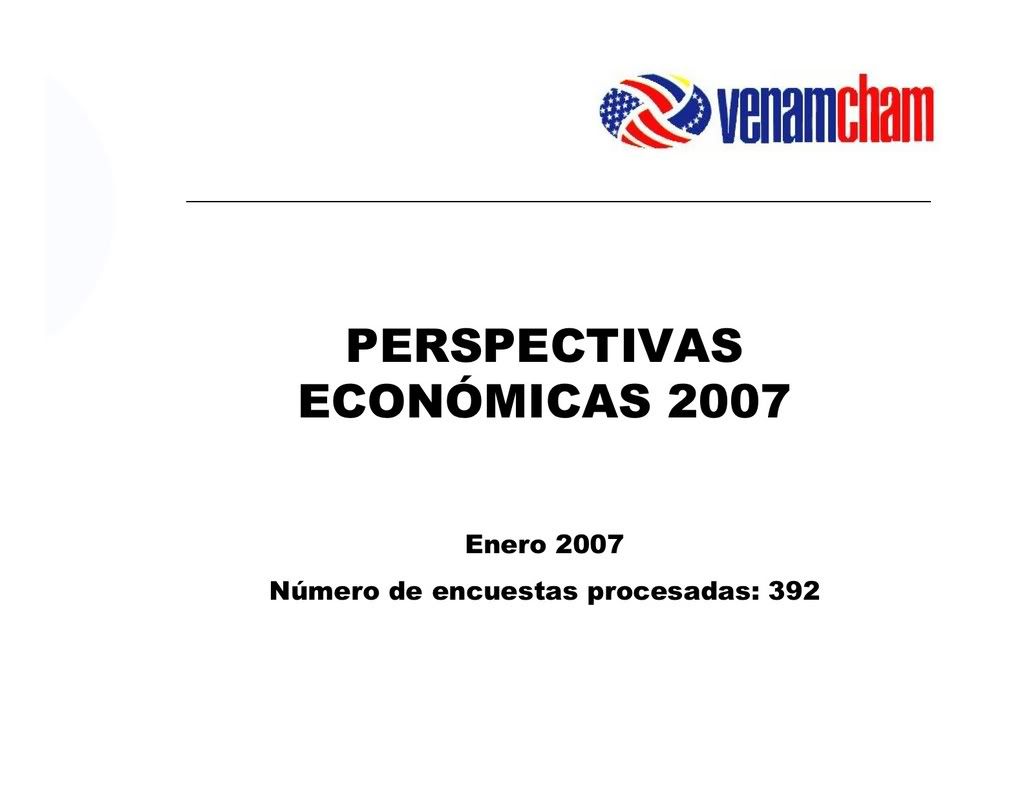
We will be looking at polling information carried out by VenAmCham of its members in late January 2007.
First we need to get some background on these companies:
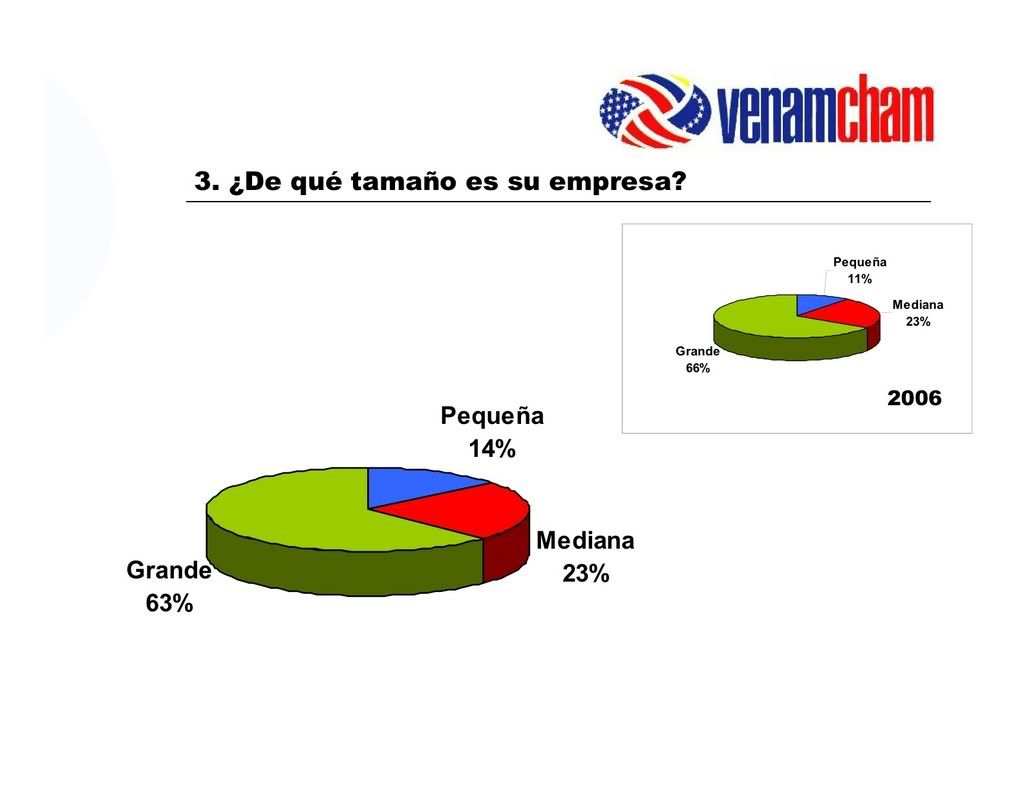
The majority of those who were polled were in large companies.
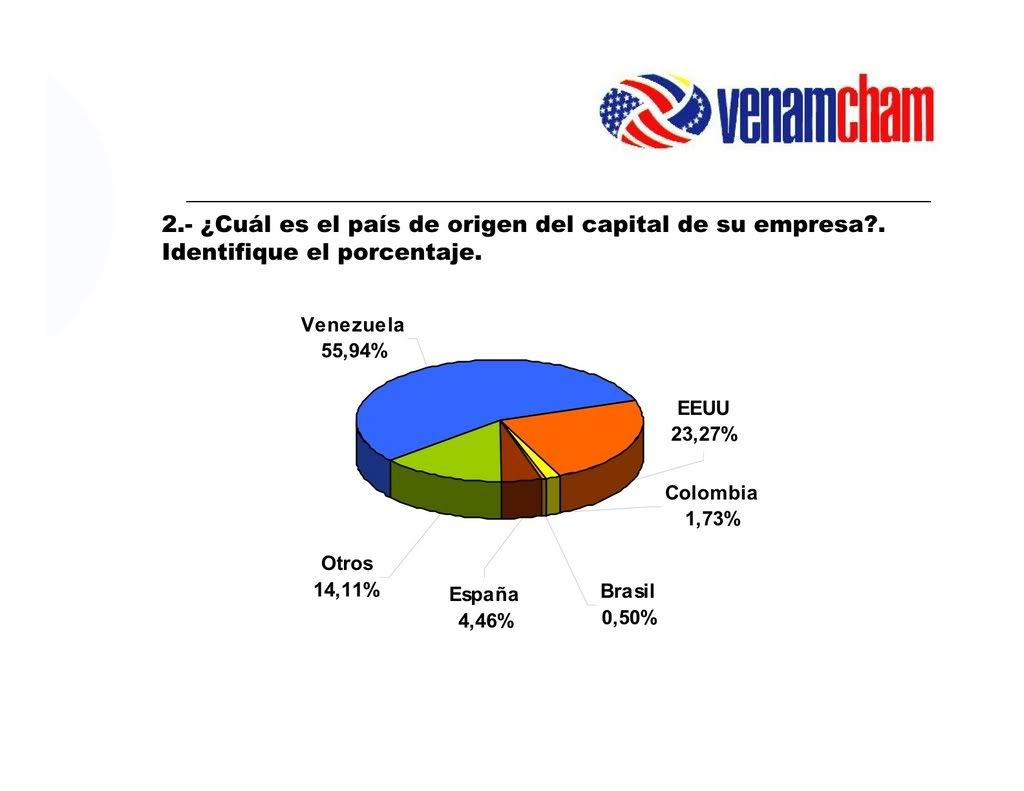
And the capital for their companies comes mainly from Venezuela but with the U.S. a large second.
Now to the details of the poll. The main indicator of the business climate, or at least business peoples perception of the business climate, is their willingness to invest. That is what the poll focused on and here are the results:
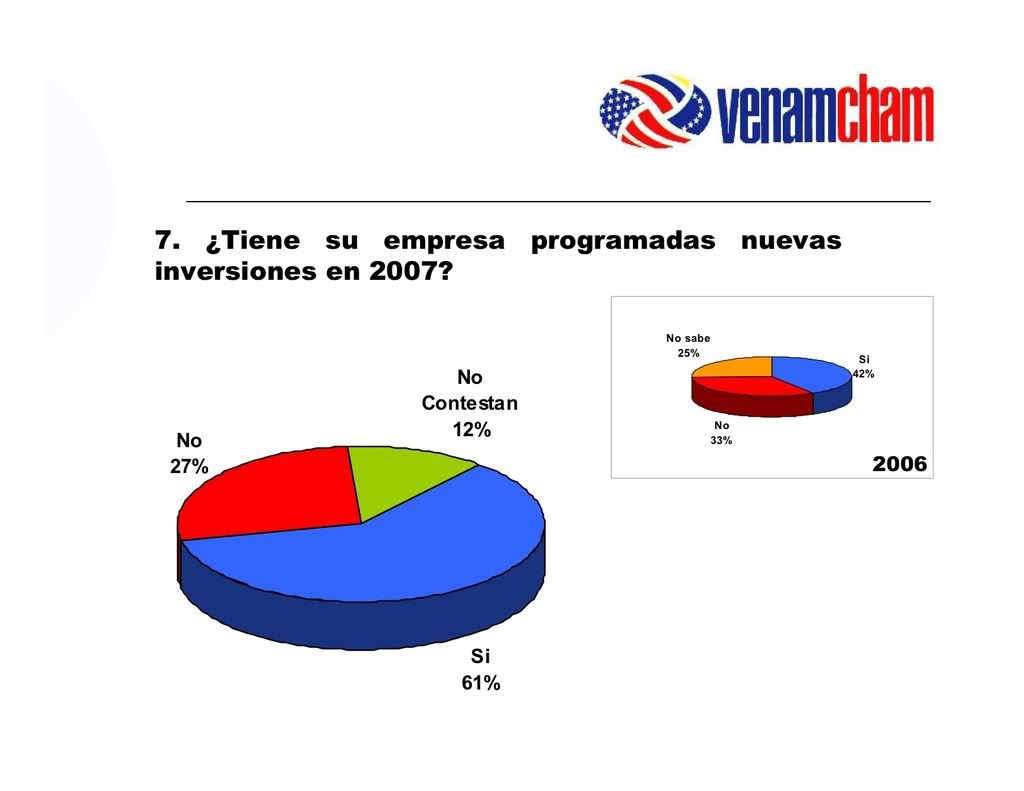
A large majority of those polled will be making new investments in 2007, 61% will versus 27% who won't.
How does this compare to recent history? Last year, 2006, only 44% planned new investments and 33% did not. So clearly businesses see increased reason to invest. And why not? The economy is booming and will likely keep growing at a healthy rate. So from their point of view it would make perfect sense to invest.
Now, what about the size of the investments? Surely that counts for something:
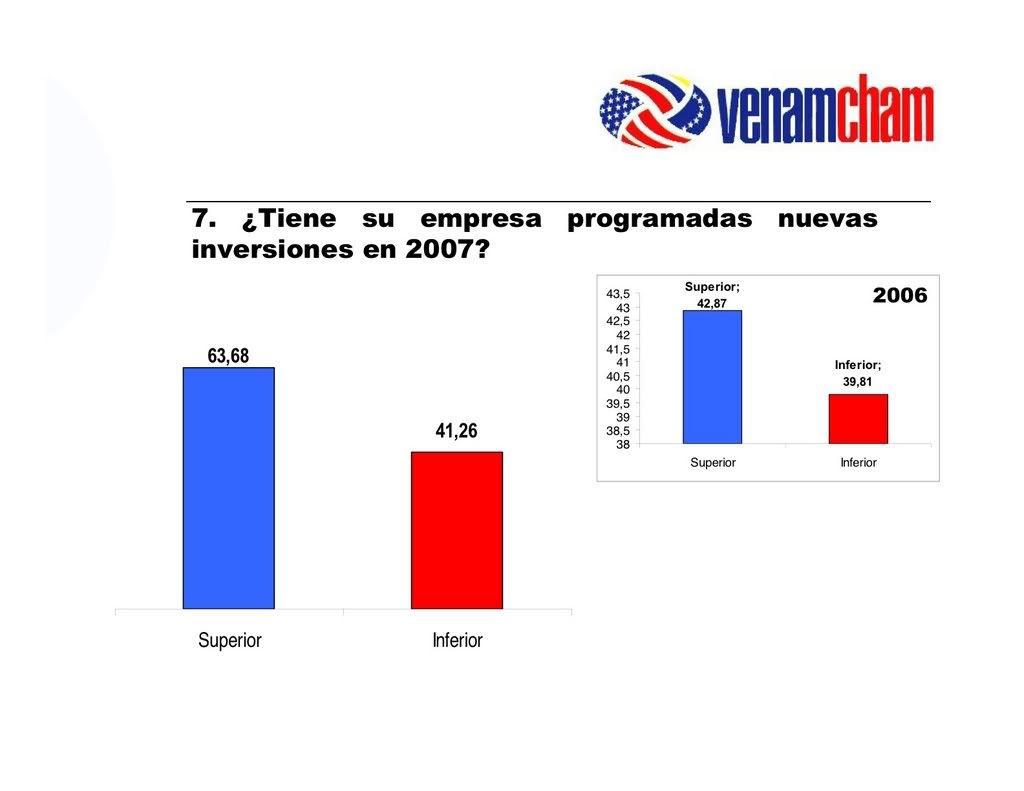
Here we see that in 2007 the 63% of businesses planning on making larger investments than before versus 41% who are planning on smaller investments. In 2006 only 43% planned to make larger investmetns versus 39% who planned smaller investments.
Lets make sure we have this straight. Not only are more companies planning on making new investments but they are increasing the sizes of those investments.
When year hear this after hearing that the income of the poorest Venezuelan's went up by 130% in real terms you can actually start to believe in trickle up economics!!
|
So far we have seen that the economy is booming...but we already knew that.
We saw that industrial production is up 24%...opposition propoganda about the country falling apart notwithstanding.
We saw that Venezuelans are today more optomistic than ever.... but we could surmise that from Chavez's overwhelming re-election on December 3rd.
Lastly, we saw that the incomes of most Venezuelans have more than doubled in real terms over the past few years...this by itself validates what Chavez has done.
In today's slides we will see that even Venezuela's business community, supposedly under assualt if one believes the opposition, is positive about the future.

We will be looking at polling information carried out by VenAmCham of its members in late January 2007.
First we need to get some background on these companies:

The majority of those who were polled were in large companies.

And the capital for their companies comes mainly from Venezuela but with the U.S. a large second.
Now to the details of the poll. The main indicator of the business climate, or at least business peoples perception of the business climate, is their willingness to invest. That is what the poll focused on and here are the results:

A large majority of those polled will be making new investments in 2007, 61% will versus 27% who won't.
How does this compare to recent history? Last year, 2006, only 44% planned new investments and 33% did not. So clearly businesses see increased reason to invest. And why not? The economy is booming and will likely keep growing at a healthy rate. So from their point of view it would make perfect sense to invest.
Now, what about the size of the investments? Surely that counts for something:

Here we see that in 2007 the 63% of businesses planning on making larger investments than before versus 41% who are planning on smaller investments. In 2006 only 43% planned to make larger investmetns versus 39% who planned smaller investments.
Lets make sure we have this straight. Not only are more companies planning on making new investments but they are increasing the sizes of those investments.
When year hear this after hearing that the income of the poorest Venezuelan's went up by 130% in real terms you can actually start to believe in trickle up economics!!
|
Thursday, February 01, 2007
Hearts and minds
As you know I don't post much on it because there are lots of blogs and web-sites that cover it much better than I could hope to do. But yesterday there were two items that caught my attention.
The first is a picture from the New York Times:
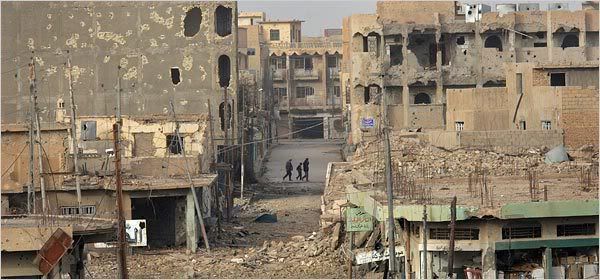
Wow, looks like sectarian violence is devestating that place, doesn't it. Not quite.
The picture is of Ramadi, the almost entirely Sunni city west of Baghdad. So this is not Shi'ite fighting Sunni. This is what happens to a city trying to resist U.S. occupation. Looks almost as bad as southern Beriut did last summer when the Israelis got through with it. I guess great countries like the U.S. and Israel think and act alike.
The next item is a video of how the U.S. meets out "justice" in its new vassal state:
I'm sure those tankers would consider on the spot destruction of their property fair punishments if they got caught stealing a candy bar out of a Seven Eleven back home.
And then they don't have a clue why they aren't very popular in Iraq!
|
The first is a picture from the New York Times:

Wow, looks like sectarian violence is devestating that place, doesn't it. Not quite.
The picture is of Ramadi, the almost entirely Sunni city west of Baghdad. So this is not Shi'ite fighting Sunni. This is what happens to a city trying to resist U.S. occupation. Looks almost as bad as southern Beriut did last summer when the Israelis got through with it. I guess great countries like the U.S. and Israel think and act alike.
The next item is a video of how the U.S. meets out "justice" in its new vassal state:
I'm sure those tankers would consider on the spot destruction of their property fair punishments if they got caught stealing a candy bar out of a Seven Eleven back home.
And then they don't have a clue why they aren't very popular in Iraq!
|
Wednesday, January 31, 2007
So simple even the U.S. State Department gets it.
Today was a pretty uneventful day in Venezuela. The economy is still humming along. The public works are getting built. People went to work, attended class, and some went to the beach. Oh yeah, and the National Assembly passed an enabling law giving Chavez power to rule by decree.
Why is the passing of the enabling law about as signiticant as people going to the beach? Mainly, because it has next to no practical effect.
Chavez just won relection with 63% of the vote. A year earlier his supporters won every single seat in the National Assembly after the opposition came up with the brilliant idea of boycotting the elections after the National Electoral Council caved in to their demands (that is right, they pulled out AFTER their demands were met, no one ever accused these people of being rational or smart).
Given that the National Assembly and the executive control all appointments to the other branches the entire government is, of course, pro-Chavez at this point. Not good you say? Maybe some of us would have qualms about any one person or party having so much power. But Venezuelans clearly do not as they have voted time after time for Chavez in ever larger numbers. The government is this way because Venezuelans want it this way - full stop.
Chavez has now asked for, and the National Assembly has given him, the power to rule by decree over the next 18 months. Predictably, those in the opposition are painting this as some sort of power grab or the advent of a dictatorship. As is usual, those charges are without merrit.
The right of the National Assembly to give the executive branch the power to rule by decree is specifically laid out in the Venezuelan Constitution. No conditions are attached to it - it does not require any kind of national emergency nor does it specify any powers which cannot be delegated to the executive and it does not impose any sort of time limit. The only requirement is that three fifths of the National Assembly vote in favor of it, a requirement easily met given the oppositions self-imposed exile from that body.
This measure is therefore completely legal and in no way contradicts Venezuela being a fullly functioning democracy. In fact, so clear is that point that even top officials at the U.S. State Department get it:
Indeed, rather than being any kind of sign of impending dictorship this is just another "tool" of democracy. And as Shannon correctly points out what really matters is how it is used.
Shannon makes another important point - the enabling law isn't anything new. As Eric Wingerter points out it has been used throughout Venezuela's democratic era.
Even more importantly, Chavez himself has had prior enabling laws. Given that Chavez has previously asked for enabling laws and pro-Chavez deputies in the National Assembly have granted it to him if the Venezuelan people had a problem with that they would have voted out the pro-Chavez A.N. members or voted out Chavez himself. Yet both have been re-elected. Cearly Venezuelans themselves have no issue with the enabling law.
[One interesting aside is that of course it is the people who voted AGAINST Chavez who are complaining about this. They curiously claim that he wasn't given a mandate to do this sort of thing. However, it seems to me rather inappropriate that people who have been against Chavez all along would pretend to discuss what his mandate is or isn't. I think that is more properly the realm of people who voted FOR Chavez and so far I'm not hearing any complaints from them]
Apart from being completely legal, what practical effect does this have? The answer is almost none. Given that the Assembly is highly inclined to vote in favor of anything Chavez wants there is no legislation that he will get with this that he wouldn't otherwise get. In other words, this enabling law does not change or expand what Chavez can do, it simply means he can do it faster. Now he can do in days what otherwise would take a few weeks or months.
So lets see what we have here:
1) a government that constantly renews its mandate at the ballot box in free elections and in accordance with the Consitution and which therefore represents the will of the Venezuelan people.
2) a government which is not violating human rights.
3) a legislature which is delegating powers in complete accordance with the norms established in the Constitution.
And the opposition is complaining about... what?
The real question with this law is not the law itself but rather how it will be used. What exact changes will Chavez make and will they take Venezuela foward and make it a better country or will they be misguided changes that hold the country back? That is the heart of the matter but one the opposition avoids because as we saw in the last election they have no alternative ideas or vision to offer the country.
The opposition chattering class is full of talking head who like to complain incessently about matters of form, such as this enabling law, while most people care about substance, such as whether or not the economy is improving. It is a free world so the opposition can keep bitching about these precedural matters for as long as they like. The vast majority of Venezuelans will simply ignore them and they will be off the road stuck in a ditch, just as they have been for most of the past eight years.
|
Why is the passing of the enabling law about as signiticant as people going to the beach? Mainly, because it has next to no practical effect.
Chavez just won relection with 63% of the vote. A year earlier his supporters won every single seat in the National Assembly after the opposition came up with the brilliant idea of boycotting the elections after the National Electoral Council caved in to their demands (that is right, they pulled out AFTER their demands were met, no one ever accused these people of being rational or smart).
Given that the National Assembly and the executive control all appointments to the other branches the entire government is, of course, pro-Chavez at this point. Not good you say? Maybe some of us would have qualms about any one person or party having so much power. But Venezuelans clearly do not as they have voted time after time for Chavez in ever larger numbers. The government is this way because Venezuelans want it this way - full stop.
Chavez has now asked for, and the National Assembly has given him, the power to rule by decree over the next 18 months. Predictably, those in the opposition are painting this as some sort of power grab or the advent of a dictatorship. As is usual, those charges are without merrit.
The right of the National Assembly to give the executive branch the power to rule by decree is specifically laid out in the Venezuelan Constitution. No conditions are attached to it - it does not require any kind of national emergency nor does it specify any powers which cannot be delegated to the executive and it does not impose any sort of time limit. The only requirement is that three fifths of the National Assembly vote in favor of it, a requirement easily met given the oppositions self-imposed exile from that body.
This measure is therefore completely legal and in no way contradicts Venezuela being a fullly functioning democracy. In fact, so clear is that point that even top officials at the U.S. State Department get it:
But the top U.S. diplomat for Latin America, Thomas Shannon, said the law isn't an issue for the United States.
``The enabling law isn't anything new in Venezuela. It's something valid under the constitution,'' Tom Shannon, the assistant secretary of state for Western Hemisphere affairs, told reporters in Colombia.
``As with any tool of democracy, it depends how it is used,'' he added. ``At the end of the day, it's not a question for the United States or for other countries, but for Venezuela.''
Indeed, rather than being any kind of sign of impending dictorship this is just another "tool" of democracy. And as Shannon correctly points out what really matters is how it is used.
Shannon makes another important point - the enabling law isn't anything new. As Eric Wingerter points out it has been used throughout Venezuela's democratic era.
Even more importantly, Chavez himself has had prior enabling laws. Given that Chavez has previously asked for enabling laws and pro-Chavez deputies in the National Assembly have granted it to him if the Venezuelan people had a problem with that they would have voted out the pro-Chavez A.N. members or voted out Chavez himself. Yet both have been re-elected. Cearly Venezuelans themselves have no issue with the enabling law.
[One interesting aside is that of course it is the people who voted AGAINST Chavez who are complaining about this. They curiously claim that he wasn't given a mandate to do this sort of thing. However, it seems to me rather inappropriate that people who have been against Chavez all along would pretend to discuss what his mandate is or isn't. I think that is more properly the realm of people who voted FOR Chavez and so far I'm not hearing any complaints from them]
Apart from being completely legal, what practical effect does this have? The answer is almost none. Given that the Assembly is highly inclined to vote in favor of anything Chavez wants there is no legislation that he will get with this that he wouldn't otherwise get. In other words, this enabling law does not change or expand what Chavez can do, it simply means he can do it faster. Now he can do in days what otherwise would take a few weeks or months.
So lets see what we have here:
1) a government that constantly renews its mandate at the ballot box in free elections and in accordance with the Consitution and which therefore represents the will of the Venezuelan people.
2) a government which is not violating human rights.
3) a legislature which is delegating powers in complete accordance with the norms established in the Constitution.
And the opposition is complaining about... what?
The real question with this law is not the law itself but rather how it will be used. What exact changes will Chavez make and will they take Venezuela foward and make it a better country or will they be misguided changes that hold the country back? That is the heart of the matter but one the opposition avoids because as we saw in the last election they have no alternative ideas or vision to offer the country.
The opposition chattering class is full of talking head who like to complain incessently about matters of form, such as this enabling law, while most people care about substance, such as whether or not the economy is improving. It is a free world so the opposition can keep bitching about these precedural matters for as long as they like. The vast majority of Venezuelans will simply ignore them and they will be off the road stuck in a ditch, just as they have been for most of the past eight years.
|
Tuesday, January 30, 2007
Blue skies
Today I am posting some more slides from the recent VenAmCham presentation on the Venezuelan economy in 2007.
The first slide gives some predictions on oil prices by some top private financial analysists:
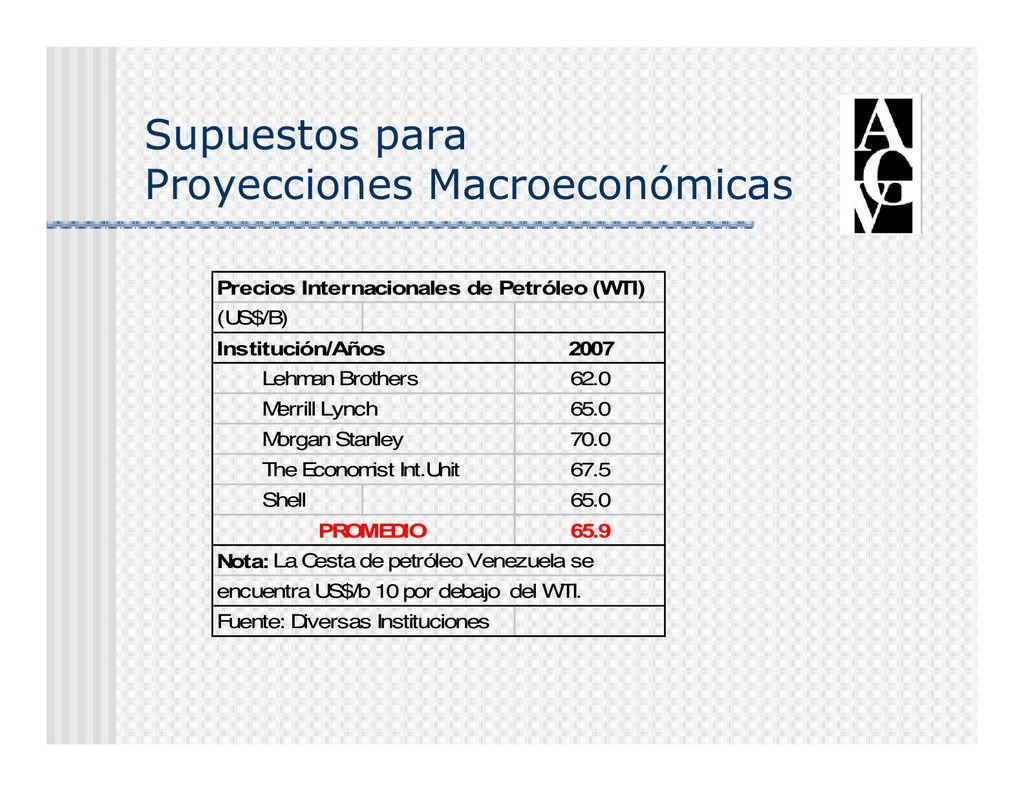
These predictions seem kind of high right now - they are all at least $10 above where the price is right now. Wonder what these people know that the rest of us don't? Anyways, if this turns out to be true, or is even close to being true, this will be quite nice for Venezuela.
Here are some actual macroeconomic predictions for 2007 and 2008.
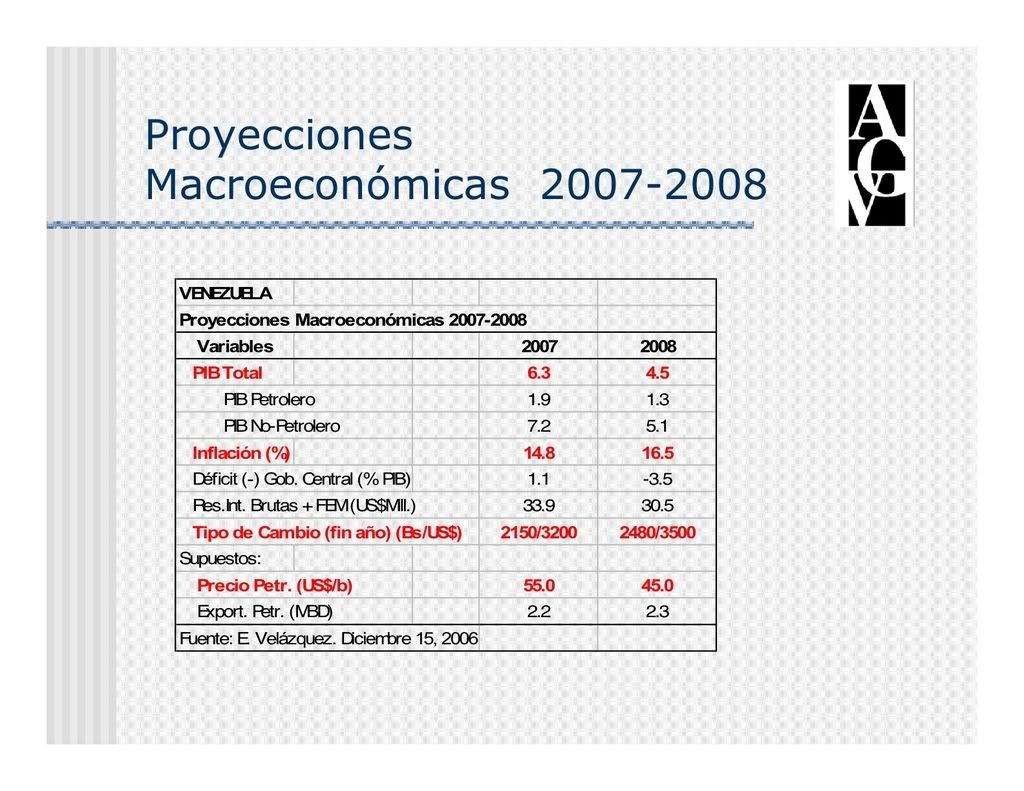
They both show healthy, if unspectacular, growth. Note that they show non-oil growth faster than oil related growth. They also both show inflation under control at around 15%. While that is not great, neither is it something that is spinning out of control. They show the government running a surplus of 1.1% in 2007 and then going into a deficit in 2008.
Overall they predict a more difficult 2008 than 2007. Why? Simple. They predict oil prices at $55 in 2007 going down to $45 in 2008.
These predictions probably can't be expected to be more reliable than weather forecasts weeks in advance. Still they do show no one is expecting any significant problems.
In fact the next slide gives a summary of what these business economists expect:
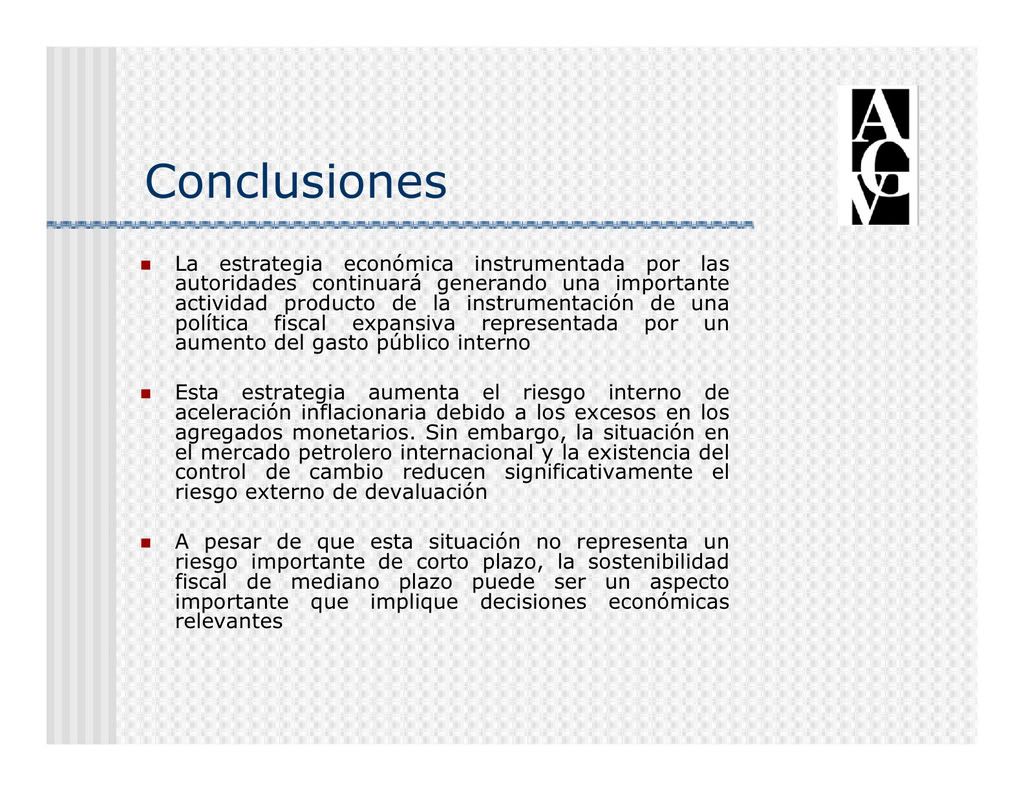
They see economic activity continueing to expand significantly due to increased government spending.
They say this creates a risk of increased inflation. Nevertheless, given current oil prices and the existence of exchange controls they see little chance of a devaluation.
There are no important short term risks, but the sustainability of the fiscal expansion in the medium term is uncertain
There is nothing terribly contraversial in all this. Everyone knows the Venezuelan economy is doing well and is likely to keep doing well. Despite the doom and gloom and hystironics of some the business class sees the Venezuelan economy being stable and continueing to grow.
Oh, and as a final note. None of our opposition friends complaining about how there is no "real" growth in Venezuela dared to offer a guess on how much industrial production had grown since Chavez came to power. Well, here it is:
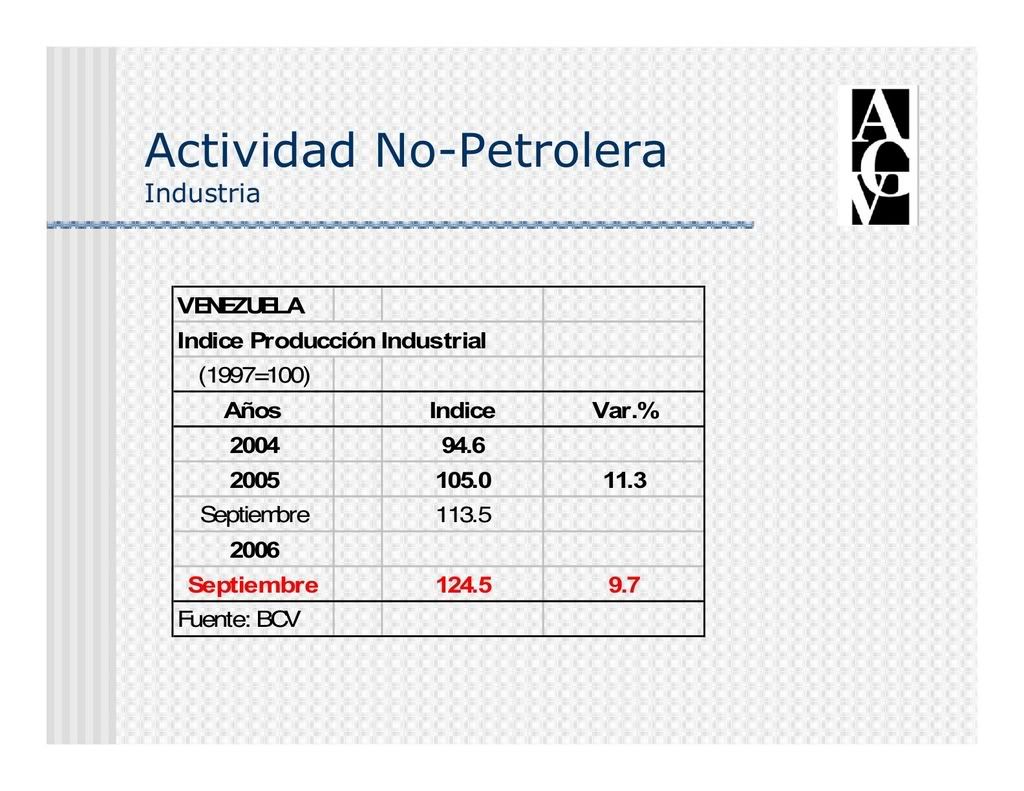
There you have it. Industrial production is now 24.5% HIGHER than when Chavez came to power. So much for the notion that Venezuela is witnessing nothing but a boom in oil prices and a boom in imports. Yes, those things are booming in Venezuela. But Venezuelans are themselves making a lot more than they did before Chavez came to office.
|
The first slide gives some predictions on oil prices by some top private financial analysists:

These predictions seem kind of high right now - they are all at least $10 above where the price is right now. Wonder what these people know that the rest of us don't? Anyways, if this turns out to be true, or is even close to being true, this will be quite nice for Venezuela.
Here are some actual macroeconomic predictions for 2007 and 2008.

They both show healthy, if unspectacular, growth. Note that they show non-oil growth faster than oil related growth. They also both show inflation under control at around 15%. While that is not great, neither is it something that is spinning out of control. They show the government running a surplus of 1.1% in 2007 and then going into a deficit in 2008.
Overall they predict a more difficult 2008 than 2007. Why? Simple. They predict oil prices at $55 in 2007 going down to $45 in 2008.
These predictions probably can't be expected to be more reliable than weather forecasts weeks in advance. Still they do show no one is expecting any significant problems.
In fact the next slide gives a summary of what these business economists expect:

They see economic activity continueing to expand significantly due to increased government spending.
They say this creates a risk of increased inflation. Nevertheless, given current oil prices and the existence of exchange controls they see little chance of a devaluation.
There are no important short term risks, but the sustainability of the fiscal expansion in the medium term is uncertain
There is nothing terribly contraversial in all this. Everyone knows the Venezuelan economy is doing well and is likely to keep doing well. Despite the doom and gloom and hystironics of some the business class sees the Venezuelan economy being stable and continueing to grow.
Oh, and as a final note. None of our opposition friends complaining about how there is no "real" growth in Venezuela dared to offer a guess on how much industrial production had grown since Chavez came to power. Well, here it is:

There you have it. Industrial production is now 24.5% HIGHER than when Chavez came to power. So much for the notion that Venezuela is witnessing nothing but a boom in oil prices and a boom in imports. Yes, those things are booming in Venezuela. But Venezuelans are themselves making a lot more than they did before Chavez came to office.
|
Monday, January 29, 2007
Why Chavez is so loved
Last week the Venezuelan-American Chamber of Commerce had its annual presentation on Venezuela’s economic perspectives for 2007. VenAmCham, as it is known, is hardly a pro-Chavez forum. Despite that, they presented some information that goes a long ways to explaining why Chavez is so popular, as we clearly saw last December 4th.
The first slide is on Venezuelan consumer confidence:

It shows that the economic confidence of Venezuelan consumers is now at an all time high. With 1992 a base of 100 it is now at 115. Prior to Chavez coming to power it was generally floundering down in the 60s whereas since Chavez has come to power it has been consistently high save during the opposition led economic sabotage of 2003.
And what could be responsible for this increased confidence? Simple, consumption is way up:

This graph shows the consumption level of Venezuelans over the past 17 years. Again, Chavez’s performance is off the charts, literally. It is up over consumption in the last year prior to his coming to power, 1998, by a whopping 32%. Venezuelans are consuming almost 1/3 more than they were 8 years ago. That sure will boost consumer confidence.
But that is not all. Note that consumption is way up over any year going all the way back to 1989. In fact, given that 1989 was low and falling it wouldn’t be surprising if one had to go all the way back to the eary 80s or late 70s to find comparable consumption levels. Again, quite impressive.
Here is an interesting charg:
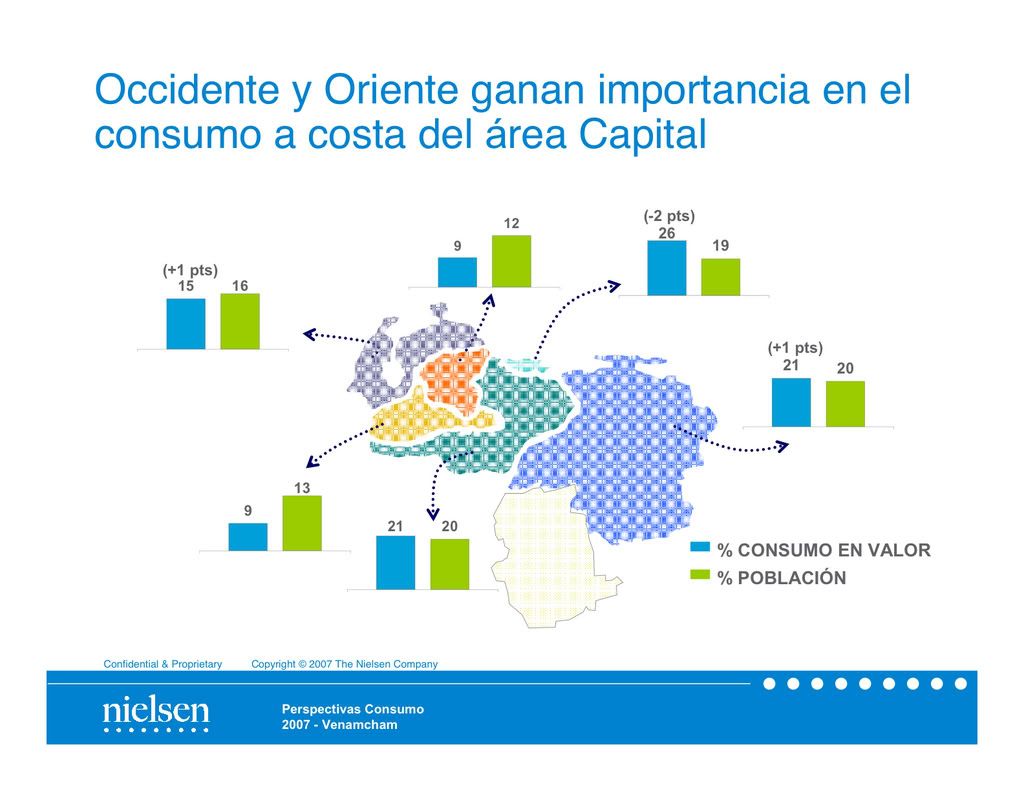
This chart shows that the different regions of Venezuela and what their percentage is of Venezuela’s overall population (in green) and their consumption as a percentage of total national consumption (in blue). Note that consumption is heavily tilted in favor of the greater Caracas area which is well known to be where a disproportionate share of Venezuela’s wealth is concentrated. Interestingly, Caracas’s share of consumption fell by 2% last year while that of the Zulia/Falcon area the eastern states went up by 1% each. Certainly not a radical change, but a welcome one. At the same time, the central-west states of Lara and Barinas are still lagging badly and probably need more assistance.
Then we come to the most impressive chart of all:

This is a graph we have seen a few times before. Now it has been fully updated through 2006. The chart shows how REAL income (that is adjusted for inflation) has changed for social class “E” (the poorest half of Venezuelan society, social class D, and social class C- which is the lower middle class.
Although it is going up now the real income of classes D and C- have are still down since 2003. Certainly that isn’t good.
Yet, at the same time, the income of social class E, which makes up 58% of the Venezuelan population has gone up a stunning 130%. That is right, the income of the poorest Venezuelans has more than doubled in the past few years. Chavez has always had as his primary focus helping the poorest Venezuelans and clearly he has succeeded – hugely.
Note also, these are not government statistics. They come from the private and reputable polling firm Datos. That is right, one of the same polling firms that correctly predicted Chavez would easily win re-election in last months elections. If they already had this data it would have been easy for them to guess that Chavez would win hands down. If you increase 58% of the populations income by 130% you probably will be able to win any election you want.
Of course, these independent statistics confirm what government statistics have been telling us for quite some time – that the poor are doing much better under Chavez than they were before. The opposition can twist, turn, squirm and lie all they want but they can’t escape this fact: this is a government that has helping the poor as its central mission. And clearly, it is being very, very successful.
|
The first slide is on Venezuelan consumer confidence:

It shows that the economic confidence of Venezuelan consumers is now at an all time high. With 1992 a base of 100 it is now at 115. Prior to Chavez coming to power it was generally floundering down in the 60s whereas since Chavez has come to power it has been consistently high save during the opposition led economic sabotage of 2003.
And what could be responsible for this increased confidence? Simple, consumption is way up:

This graph shows the consumption level of Venezuelans over the past 17 years. Again, Chavez’s performance is off the charts, literally. It is up over consumption in the last year prior to his coming to power, 1998, by a whopping 32%. Venezuelans are consuming almost 1/3 more than they were 8 years ago. That sure will boost consumer confidence.
But that is not all. Note that consumption is way up over any year going all the way back to 1989. In fact, given that 1989 was low and falling it wouldn’t be surprising if one had to go all the way back to the eary 80s or late 70s to find comparable consumption levels. Again, quite impressive.
Here is an interesting charg:

This chart shows that the different regions of Venezuela and what their percentage is of Venezuela’s overall population (in green) and their consumption as a percentage of total national consumption (in blue). Note that consumption is heavily tilted in favor of the greater Caracas area which is well known to be where a disproportionate share of Venezuela’s wealth is concentrated. Interestingly, Caracas’s share of consumption fell by 2% last year while that of the Zulia/Falcon area the eastern states went up by 1% each. Certainly not a radical change, but a welcome one. At the same time, the central-west states of Lara and Barinas are still lagging badly and probably need more assistance.
Then we come to the most impressive chart of all:

This is a graph we have seen a few times before. Now it has been fully updated through 2006. The chart shows how REAL income (that is adjusted for inflation) has changed for social class “E” (the poorest half of Venezuelan society, social class D, and social class C- which is the lower middle class.
Although it is going up now the real income of classes D and C- have are still down since 2003. Certainly that isn’t good.
Yet, at the same time, the income of social class E, which makes up 58% of the Venezuelan population has gone up a stunning 130%. That is right, the income of the poorest Venezuelans has more than doubled in the past few years. Chavez has always had as his primary focus helping the poorest Venezuelans and clearly he has succeeded – hugely.
Note also, these are not government statistics. They come from the private and reputable polling firm Datos. That is right, one of the same polling firms that correctly predicted Chavez would easily win re-election in last months elections. If they already had this data it would have been easy for them to guess that Chavez would win hands down. If you increase 58% of the populations income by 130% you probably will be able to win any election you want.
Of course, these independent statistics confirm what government statistics have been telling us for quite some time – that the poor are doing much better under Chavez than they were before. The opposition can twist, turn, squirm and lie all they want but they can’t escape this fact: this is a government that has helping the poor as its central mission. And clearly, it is being very, very successful.
|
